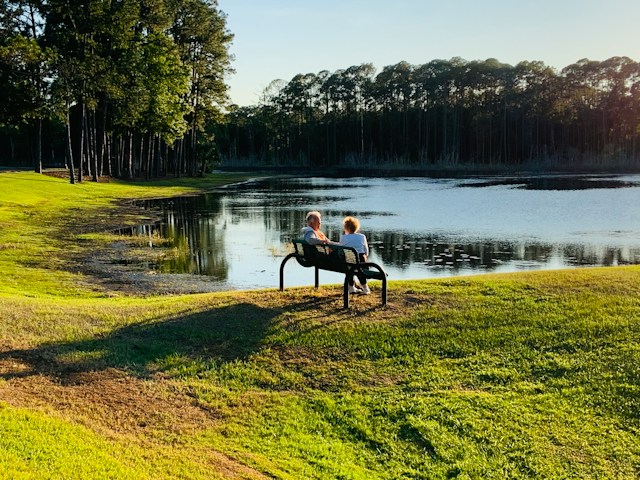Abe & Bessy
Homer Wallace poked indifferently at his fruit cup and pondered his predicament. He didn’t like his name. He had traveled 78 years and it had been a burden from the beginning.
If he hadn’t promised his mother that he would respect the memory of her two brothers who died in a freak silo fire in Kansas right after the “war to end all wars,” he would have changed it to something more appropriate, more stirring, an appellation clearly resolute and commanding. Anything, but Homer.
He found a sliver of cherry and picked it up with his spoon. He liked cherries, which were rare dessert fare, and he really liked Bessy Lawrence who sat with her back to him two tables over at The Renaissance assisted care living facility in Dearborn, Florida.
“You look positively sickly.”
Homer let the thick, sweet fruit juice carry the sliver of cherry down his throat before responding to Benny Wilkins. “I knew you were coming, that did it.”
“You going to play Bingo?”
“I never play Bingo.”
“So, Homer, you could change your mind? It happens, even to a nasty codger like you.”
Mindless, Homer groaned. “I’m sure you’ll be the life of the party.”
Benny stood as erect as his arthritic back would permit, his baggy red and yellow-checkered shirt testimony to the fact that he had purposely lost almost thirty pounds in the last year. “Hey, winning is not so bad. And it’s fun. You could use a laugh.”
Homer noticed Bessy massage her right wrist and move her chair back from the table. In his four months at The Renaissance, he had been unable to find out what was wrong with her wrist, but he felt terribly sorry for her. “Get on with you,” he said waving Benny off.
Most of the hundred or so residents were making their way out of the dining hall for different destinations. Some to their rooms for medication or an afternoon nap, to the lobby to read or listen to Peter, one of the nursing aids play his guitar, or to the giant television screen and the interminable soap operas so many women enjoyed or to Bingo which he concluded was an exercise in tedium.
“Hi Bessy,” he said, all too softly, as she passed with her best friend, Nanny Grinstein, but apparently she didn’t hear him.
At the entrance to the dining room, Benny hooked his hand under Gibby Dawson’s elbow for added support. They were talking animatedly. Homer noticed that every once in a while they looked over at him and the deserted tables that surrounded him and their glancing glare only increased when Bessy and Nanny caught up with them.
Homer walked through the lobby crowded with residents talking, reading in silence, or sleeping off lunch while others stared into the oblivion that was their future. He pushed open the front door and walked passed a landscape of hydrangeas basking in the unforgiving Florida sun. His right leg hurt. It had been getting worse lately. He grimaced under the weight of life’s glare and lowered himself onto one of the shaded wooden benches that skirted the front of the beautifully landscaped, year-old facility.
He had moved into The Renaissance on the birthday he gladly shared with Abraham Lincoln. How would the President have dealt with Bessy Lawrence, Homer questioned? Homer decided it wasn’t fair to Abe to put him in such a predicament, considering that his questionable choice of Mary Todd.
A friend of Benny Wilkins came out to partake of his after lunch cigarette. He would puff and cough, and then puff deeper, followed by a cough that sounded as if it had been wrenched up from his toes. Homer didn’t know his name and had no intention of becoming friendly because he had heard that the man refused to speak to his children in twenty years.
He and Allison had no children and, when she died from a stroke eight years ago, he had become positively virtuous about parents staying in contact with their children, like Bessy with her two sons and five grandchildren in New York.
The shade of the canopy overhead was slipping away revealing approaching waves of steamy yellow.
Two women came out and sat down on the remaining bench. Just as he was prepared to save the rest of his left foot from being baked, the door opened and Bessy Lawrence appeared. His heart raced, his mind fumbled with the possibility of hope. She walked toward the two other women and was instantly engaged in a seemingly profound exchange.
When men talked to each other, it was merely conversation. When women were together, dialog was meaningful and immediate; their emotions exposed, their words laced with the realities of life. Allison was especially good at it. She could engage even the most recalcitrant into heartwarming confessions. Homer was conscious he was staring at Bessy, and after a while one of the other two women looked over, then all three turned towards him.
“Now what, you old fool?” he chided himself.
Angela Brennan, the facility administrator, drove up, parked her car, and came right towards him. Homer wasn’t quite certain of her, and learning she was only thirty-four and into her third marriage, didn’t exactly engender confidence.
“You’re always the first out here after lunch, Homer Wallace,” Angela said, plunking herself down next to him.
“How are you?”
“My cousin is supposed to meet me downtown for dinner and I swear I don’t have the energy to make the trip in this heat. And that woman can eat! I have to watch every morsel. And she always rattling on about how her daughter did this wonderful thing or her twin boys are the most amazing children, ever. And God help us all if her husband, God knows what that man does for a living, opens his mouth about his latest hunting adventure. I swear the man can hardly talk about anything else but his guns and his fishing as if he was put on this earth just for the purpose of killing small animals and frying trout.” She glanced down at her watch and jumped up, “Now don’t you be a stranger. Come see me if you have any questions or problems. You have a good day now. Hi ladies,” she chirped all in the same breath as she disappeared into The Renaissance.
She had more to say in that mouthful than he had in a day, Homer thought as Bessy get to her feet and began walking towards the front door, then continued in his direction.
“You can’t get a word in edgewise with that woman, but she means well and she does work a twenty-hour day around here,” Bessy offered.
“I don’t know how she does it?”
“Does what?”
“Talks.”
“You talk.”
“No man I ever met talks like that.”
“Perhaps Angela is a bit extreme,” she said backing into the bench so she could sit comfortably.
Homer couldn’t contain his delight. “You know her?”
“After a year, you know who to turn to for help.”
Bessy Lawrence was so pretty, trim, and had a manner about her that Homer found pleasing and naturally romantic. He always thought she was keeping a very small secret and that she was waiting for someone to come by and ask the one perfect question that would reveal that which she held closest to her heart.
“I like the way you dress.”
He looked down at himself. A pair of pressed beige pants, a short sleeve shirt that Allison had given him for no apparent reason. Nothing out of the ordinary. “I dress like everyone else.”
“Not at all. Your pants look like they were set on a hanger, your shirts are brighter and newer than most here, and you never give the appearance of being disheveled. That matters you know. Not keeping up your appearance can be a sign of depression.”
“What if a man was a slob to begin with when he came in, you might think he was depressed after seeing him just once?”
“If he was disheveled or depressed I certainly wouldn’t take the liberty of sitting down next to him.”
“In that case, I’m glad I put on new slacks today.”
“So am I,” she said with obvious delight. “Do you like to be called Homer or Wally?”
“I don’t like either.”
“Oh, you poor man,” she said. “All your life?”
“Every day in every school class in every meeting, I never liked either and couldn’t do anything about it. I never got a middle name either,” Homer said as if there was no end to his torment.
He was more thrilled than he could recall. He didn’t think the conversation could last long if it were only about his pants or name and being unable to think about what to say next he was taken with a shade of sadness.
“My middle name is Margaret.”
Homer beamed. “My grandmother’s middle name was Margaret.”
“It’s a beautiful name.”
“Do they call you Maggie?”
“Years ago they did. There was a time when I liked it. Not anymore,” she answered, massaging her right wrist.
“People change.”
“They get old.”
“I’ve heard,” Homer said, already feeling indebted to Angela Brennan. “But with the smart ones, it’s only in the bones.”
She laughed. “Now you sound like my father.”
“He must have been proud of you.”
She turned to him. “Why do you say that?”
“I’m not sure. It just seemed to me that he would be, with you being who you are.”
“Do you know who I am?”
“No, I didn’t mean it that way, but sometimes you just know things.”
A soft breeze interrupted their conversation, and each was content to ponder the afternoon. Homer noticed the sun covered both his feet.
“It can be very beautiful here during the fall. There’s always a light afternoon chill and I come out here with my favorite green sweater right after lunch and think about my day, and the day before and the day after.”
A large brown squirrel ran after a smaller one on the lawn. They circled each other, scampered half way up a tree before the large one cut off the smaller squirrel’s path. The larger squirrel did not pursue, and waited for the smaller one to calm down.
Bessy folded her sweater in her lap, always a sign of deep contentment to her, and wished she were in her childhood home in Vermont. Growing up was a sweet life full of soft surprises and tender moments in a world where there was peace at the table even if the world outside tore itself apart every few decades. She could almost taste the sweet cider, the thick maple syrup, the pancakes her grandfather would heap on her plate, the sound of her baby sister’s hysterical giggle when she failed to do the dishes on time and their father would chase her around the house until he caught up with her, threw her over his strong shoulder and plopped her down in front of the kitchen sink.
“Have you ever been to Vermont?”
Homer considered the question with great care. “No.”
“It’s a beautiful state. Rich in spirit and soul and bounded by tree covered mountains and the ocean. It was a wonderful place to grow up.”
“I’m from Chicago,” Homer said. “My parents were born there too. Both on the same day a long time ago.”
“I like birthdays. I’ve noticed many people around here don’t.”
“Better to have someone to celebrate with.”
“That’s always the best.”
“My birthday is in November. On the 4th. I like the cold weather, or I did when I was a little younger.”
Homer’s head nearly twisted itself off. “Lincoln married Mary Todd on November 4th!”
“Our President Lincoln?”
“The very same, and on your birthday.” Magic.
“Well, in spite of what you may think, sir, I wasn’t born quite yet.”
More magic. “I thought nothing of the sort, ma’am.”
“I think someone mentioned—it may have been Benny—that you’re a Lincoln buff.”
“You’ve been inquiring about me?”
“Gossip. It comes with every new resident. Don’t get a swelled head over it.”
Bessy got up, overly conscious that she was wearing a dress that was less flattering than others in her closet. It had been so long since she thought about such things, but she had noticed Homer Wallace right from the start and if she hadn’t been ministering to Nanny Grinwald’s ever-present malaise, would have turned to him as he called out when she passed his table after lunch.
He was lanky, and handsome in a way that reminded her of the old movie stars. Gary Cooper and Jimmy Stewart came to mind. They had the same quiet intensity and confidence that lit up the screen and made women wonder. And she saw sincerity in his eyes as well as caution and natural distrust. She liked him instantly. She only regretted it had taken her so long to muster the courage. Now the wait seemed so unnecessary, so foolish.
“Walk with me?”
“I’d be delighted.” Homer pushed himself up from the bench with the strength and resolve of a much younger man.
They moved along slowly, as did everything at The Renaissance. Sometimes the pathway narrowed and their shoulders touched, a bird would skim the ground and Bessy would tell Homer what kind it was, and when he asked how she knew she responded by saying she thought it was important for her children to know. That pleased him greatly.
He asked about her wrist, which she had sprained months ago, but the stiffness and residual pain still nagged at her. He offered some advice about how to exercise it, something the staff physical therapist never mentioned. She was grateful, and very impressed.
She stopped and reached out for his elbow. “I think you should have a nickname.”
“Why?”
“It’s time that you were happy about telling people who you are.”
“I would like that,” he said, accepting the emotional loophole a nickname provided rather than actually changing his name.
“From now on you’re not Homer or Wally or anything that you don’t think fitting. Abe would be a perfectly fitting name for a man of your character.”
“How do you know about my character?”
“I know. Sometimes you just know.”
A squirrel, doubtfully one of the first pair raced out in front of them, pinched what looked like a small nut in its mouth, and scampered back into the dry underbrush. The high-pitched wail of an ambulance in the distance made them both turn. The conversation danced along from politics to baseball.
Finally, they settled down back on the bench and each, in turn, excoriated every possible aspect of The Renaissance from its food, nondescript and limited, to the service, also nondescript and limited. Except that it was improving, they had to admit that. And the grounds were well-tended. Trimmed, nourished and watered with stony regularity, tending the gardens, he speculated, were a commercially necessary selling point for future residents.
“I like talking to you.”
“I like talking to you, too.”
“And its important to have quality futzing time every day,” Abe added thoughtfully.
“Futzing?”
“Futzing. To futz. The act of one, futzing.”
“Futzing.”
“You never knew you futzed?”
“Well, oddly enough, it’s never been brought to my attention.”
“What are friends for if not to enlighten those who labor in darkness?”
“Was I laboring in darkness before I met you?”
“No, but I was.”
He was easy to talk to, with a biting sense of humor she missed even in her husband whom she loved dearly. This tall, gangly man had made her think, and she knew only a very special person could do something that special. Even with visits from her children, this last year had been a difficult transition. She was used to moving about on her own, and when the doctor said she could no longer drive because of her eyesight and her hip became more arthritic, it just seemed the right time they all agreed.
Normally she would have fought to the end, but recently she felt as though she was withdrawing into herself, ignoring her neighbors and friends, though so many had died and gone on to other nursing homes it was hard to count who was left that counted.
Then came Abe.
“Do you want to do something?”
“Now?”
“No, I didn’t mean that,” he said, regretting that his mouth had gotten the better of his senses.
“You mean tonight?”
“Well?”
“You’re right, it’s Saturday. I didn’t realize that.”
“I was just thinking.”
“No, I like the way you think Abe. It makes me think. That’s very important to me.”
“I mean I don’t want to be pushy.”
There was an enlightening freshness about being near this man. “You know, I was thinking of the same thing.”
Surprised and delighted, Abe said, “About tonight?”
“I heard it’s going to be cool tonight, and for the next few days.”
“We could use it.”
“It would be nice to do something special.”
But Abe couldn’t think what there was to do. Both had given up driving and they were a half a mile from the nearest mall or stores. “You’ll have to wear your favorite green sweater.”
“You’re very sweet to remind me,” she said, patting his hand.
Abe already knew he needed Bessy Lawrence. It was a strange and welcome vulnerability.
“Yes, we should definitely do something,” she reaffirmed.
“Absolutely, definitely.”
She began to laugh. “How about a game of Bingo?”
“What a great idea.” He was thrilled. A new name and maybe a girlfriend, all in one afternoon.
“Then we can come out here and spend some time futzing.”
“You’re becoming a very good futzer.”
“It’s the company I keep. I’m finding it positively inspirational.”

Arthur Davis was nominated for a Pushcart Prize, received the 2018 Write Well Award for excellence in short fiction and, twice nominated, received Honorable Mention in The Best American Mystery Stories 2017. His work has been published in journals as original and reprint fiction. Additional background at www.talesofourtime.com, Amazon Author Central and the Poets & Writers Organization Directory.



